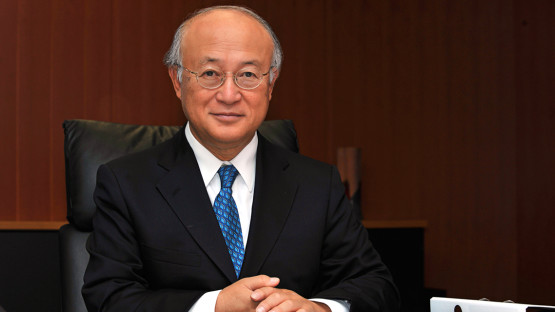(As prepared for delivery)
Excellencies, Ladies and Gentlemen,
The accident at Chernobyl was the world’s most serious nuclear accident and a great human tragedy.
On the 30th anniversary, we remember with respect and admiration those who lost their lives in the emergency and recovery operations.
Hundreds of thousands of people were affected by high radiation doses. Some 350,000 people were forced to leave their homes in severely contaminated areas. This was deeply traumatic for all concerned and had a lasting impact on their lives. Their suffering must not be forgotten.
Since 1986, radiation levels in the environment have fallen by a factor of several hundred, due to natural processes and counter-measures. Most of the land contaminated with radionuclides has been made safe and returned to economic activity.
The IAEA provided extensive assistance to the regions affected by the disaster.
We made a key contribution in remediation of affected cities and farmland, monitoring of human exposure to radiation, and dissemination of information.
That assistance continues today.
In Ukraine, for example, we continue to help with decommissioning of the reactors and radioactive waste management at the Chernobyl site. We are also supporting a regional project on radiological management of abandoned areas.
In Belarus, we have assisted with forest management in areas affected by the accident and helped our national counterparts to implement environmentally sound remedial technologies.
Ladies and Gentlemen,
Chernobyl led to a leap forward in global cooperation on nuclear safety. Countries with nuclear power began sharing information and experience in a way they never had before. The IAEA’s mandate on nuclear safety was enhanced. IAEA Safety Standards were expanded.
Important international legal instruments were adopted, including the Convention on Nuclear Safety. An international coordinated response system, with the IAEA's Incident and Emergency Centre at its heart, is now in place.
An IAEA peer review system has also been established. This involves the deployment of international teams of experts to advise countries on the operational safety of their nuclear reactors or the effectiveness of their regulatory system.
Ladies and Gentlemen,
Despite the improvements made after the Chernobyl disaster, the world was confronted with another serious accident – at the Fukushima Daiichi nuclear power plant in Japan – in 2011.
This was a painful reminder that a serious accident can occur even in a technologically advanced country with a mature nuclear programme.
In the five years since then, considerable improvements have been made in nuclear safety throughout the world.
But the key lesson from both Chernobyl and Fukushima Daiichi for everyone involved in nuclear power – plant operators, governments and regulators – is that safety can never be taken for granted. Complacency must be avoided at all costs.
Nuclear safety is primarily the responsibility of individual States. But accidents can transcend borders, so effective international cooperation on nuclear safety is vital. The IAEA plays the leading role in bringing States together to uphold the highest safety standards.
We remain committed to helping our Member States to do everything humanly possible to ensure that accidents such as those at Chernobyl and Fukushima Daiichi never happen again.
Thank you.


